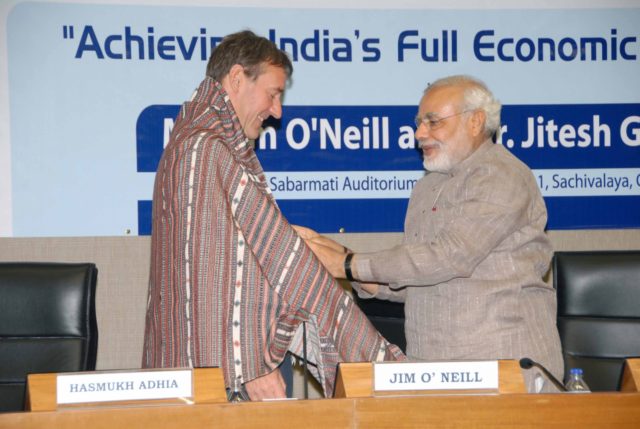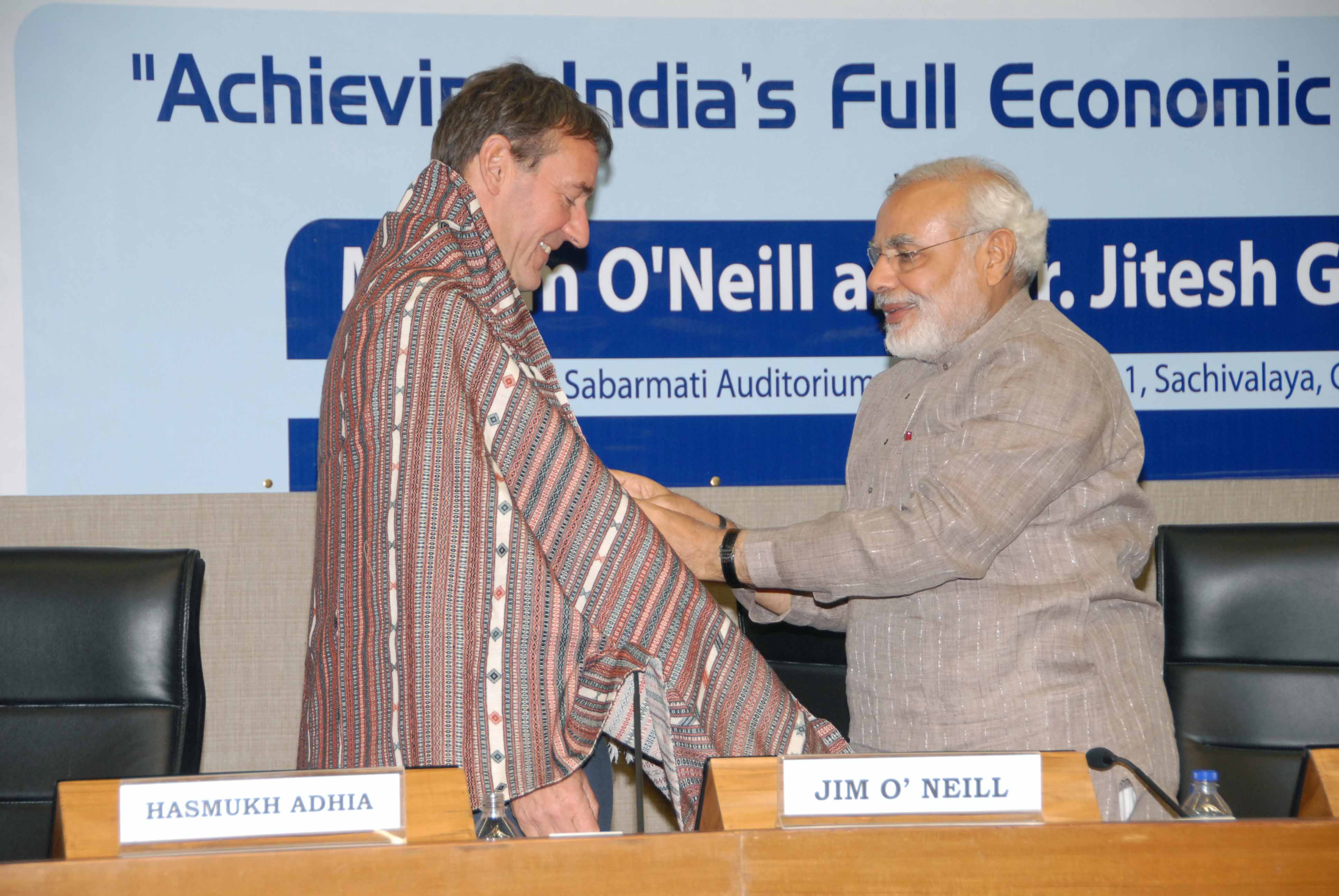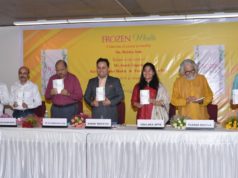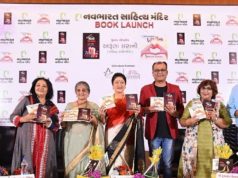Chief Minister Narendra Modi attended an interactive session on 17th June 2013 on ‘Achieving India’s Full Economic Potential’ with Mr. Jim O’Neill, a world-renowned economist with an expertise on emerging markets. Mr. O’Neill also headed Goldman Sachs. The interactive session was a part of Vibrant Gujarat Lecture Series.
{loadposition adinarticle} Here is the Speech of Chief Minister Narendra Modi during interactive session on “Achieving India’s Full Economic Potential” at Sabarmati Auditorium, Swarnim Sankul 1, Gandhinagar:
Mr. Jim O’Neil, Mr. Jitesh Gadhia, my colleagues from the state government, captains and representatives of industry, ladies and gentlemen.
It is a real pleasure to welcome and meet a person like Jim O’Neil. He has been a leading expert on the global economy, particularly the emerging markets. He is also well known as a currency guru. I welcome you Jim, to India and to Gujarat. I hope that today’s interaction will enrich my team and me. I am sure that we will leave the session with newer insights on the global and Indian economy.
Friends, in 2003, Goldman Sachs led by Jim, had predicted that the BRIC countries would overtake the G6 countries by 2050. The world was taken aback. We, in India, were pleasantly surprised.
In the following decade, the BRIC countries behaved to a great extent as predicted, particularly China. We were hoping that India too would grow at a similar rapid pace.
Unfortunately, however, we have not been able to achieve our full potential. Not only that the last decade has been stuck in uncertain and uneven growth. This is further compounded by policy paralysis and mis-governance. We have lost a historic opportunity in the process.
I have read Jim’s 2008 paper ‘10 Things for India to Achieve its 2050 Potential’ with keen interest. I am quite convinced about what he is saying. You will notice that many of the domains he talks about do not fall within the jurisdiction of a state government in the federal structure of India. Yet you will find considerable similarity in our approaches to growth and development. In fact, many of the ideas which Gujarat has followed and Jim professes as well are very common-sensical.
They are the basics for the development of a developing region like India or its constituents. Many of you may recollect that we started our journey with strengthening governance. It was a bad time in 2001 as we were hit by a devastating earthquake. Amongst our initial steps were setting up mechanisms for inter-departmental sharing and coordination. E-governance, system re-engineering and rigorous monitoring, were other areas of focus.
Transparency, openness and people’s participation were also insisted upon right from the beginning. The overall idea was to move from Government to Governance. From Rules and Acts to Responsible Action.
I am now happy to say that these seeds that we sowed, have grown into towering trees. Our innovations in the social sector and progress on HDI parameters have been appreciated far and wide.
Many of our initiatives have been recognized at national and international levels. This includes awards from World Bank, CAPAM and the United Nations. Another paradigm shift was weaving the entire development model around a well thought- out strategy. In the initial one month itself, we had laid out our strategy of Panchamrut or Five Nectars. This comprises of the domains of energy, water, knowledge, human resource and security.
Since then, we have been working aggressively to develop these sectors and domains on a fast track basis. We have just completed our annual school enrollment drive, which we started 10 years back. This has had a tremendous positive impact on basic education, particularly the girl child education. Starting with our focus on strengthening the primary and secondary education, we moved on to creation of new age academic institutions and universities.
The result is that today there is a six fold increase in the intake capacity of technical institutions and a four-fold increase in the number of universities. Not only the numbers, but in terms of quality as well; we have tried to engage with the global best. Earlier this year itself, 120 international and 52 national universities had come together to give a brighter shape to our higher education system.
A decade before, the financial situation of Gujarat was weak. This was further compounded by crumbling of livelihood and infrastructure due to successive droughts and the earthquake. Our public sector units were running in losses. The state finances were running into severe fiscal deficits. Starting with tightening on the expenditure front, we improved the management of the public sector undertakings substantially.
We also enacted the Fiscal Responsibility Act and adopted various means of reducing non-developmental expenditure. Thereby, we were able to allocate more money on the development front. The result is that we are in surplus now. Most of our PSUs have turned around and have enhanced their market cap. Another beauty of this exercise is that it is achieved without levying new taxes or enhancing them.
Another front on which Gujarat stands out clearly is in establishing global linkages in trade and investment matters. In fact, Gujarat today is amongst the most preferred FDI destinations in India. Not only that, we have developed long term relationships with a large number of countries and their Industry. Our biennial global investors summit has become a platform for global tie ups. The last event held in January 2013 saw participation of 121 countries as well as most of the Indian states.
Against India’s average 2-3% agricultural growth, Gujarat’s agriculture has been growing at around 10% annually over the last decade. This has happened due to a lot of hard work on the part of government, agricultural universities and scientists, and most importantly the farmers. We have focused on water harvesting on a wide scale. At the same time we have also introduced micro irrigation techniques to ensure more crop per drop.
Simultaneously, we introduced scientific agricultural practices to enhance agricultural productivity and crop diversification. We have recently concluded our annual agri-fair which has become a platform for dissemination of knowledge in agriculture, food processing, horticulture and animal husbandry.
On the infrastructure front, we have been working with the desire to benchmark it to the best globally. We already have the best in India, but we are going further. Both on the core and industrial infrastructure, as well as social infrastructure; we have evolved PPP models and practices which are considered to be the best in India. In 2011, a joint study of The Economist and ADB established that Gujarat is the best PPP destination in India.
We are further making a huge shift in our approach by establishing large size investment regions. We are planning to promote them as global hubs of economic activity.
Ensuring environmental safety and quality has been my pre-eminent desire. We have been insisting to do things in a way that we consume lesser Natural resources and still become more productive. We are the biggest earners of carbon credits in India.
Going further, Gujarat has emerged as a global hub of solar energy in addition to its sizeable share in wind energy. We have established Asia’s biggest solar park with a capacity of 600 mega watts. We are also keen on developing eco-friendly practices and systems, particularly in our urban and industrial locations. We are working with the motto of Gujarat’s growth for India’s growth. We know that India cannot develop unless the States develop.
We also know that there is a lot to be done by us in the states, particularly if India has to achieve its full potential.
We can definitely do better if the national policies are aligned towards a greater vision of a developed India. I am a positive person. I am sure that we will do even better than predicted by Jim.
Sources: CM’s site / Gujarat Information Bureau









